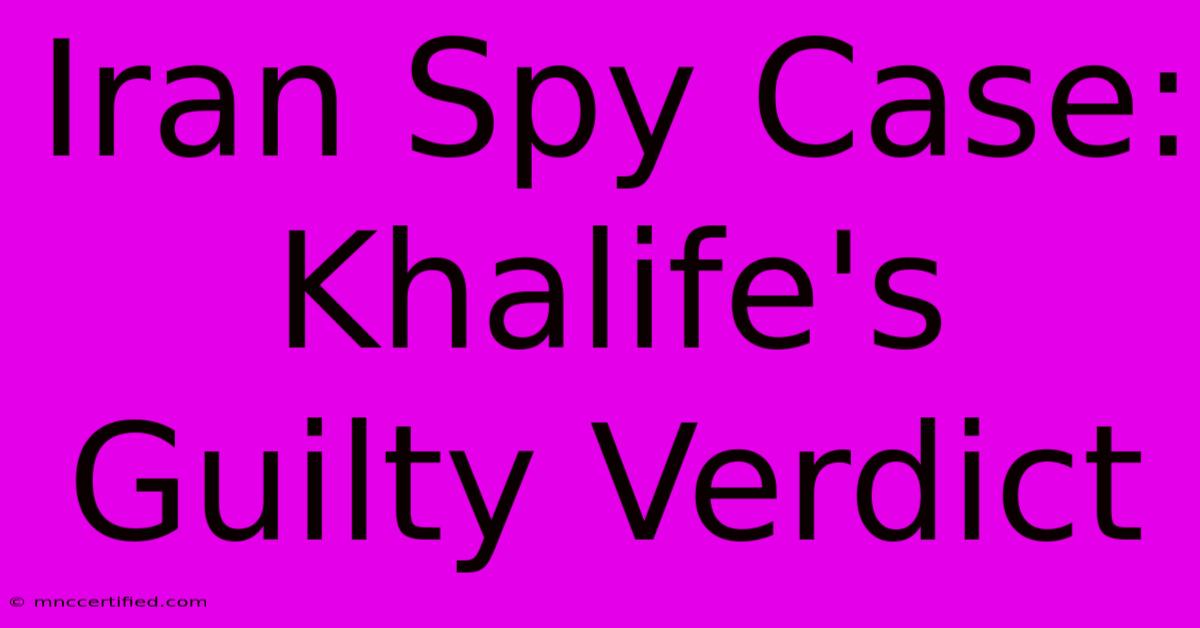Iran Spy Case: Khalife's Guilty Verdict

Table of Contents
Iran Spy Case: Khalife's Guilty Verdict – A Deep Dive into the Sentencing and its Implications
The recent guilty verdict against Daniel Khalife in the high-profile Iran spy case has sent shockwaves through the UK and beyond. This article delves into the details of the case, the significance of the sentencing, and the broader implications for UK national security. We'll explore the key evidence presented, the potential ramifications for UK-Iran relations, and the ongoing debate surrounding intelligence gathering and espionage.
Understanding the Charges Against Daniel Khalife
Daniel Khalife faced serious charges related to espionage, specifically accused of gathering and passing sensitive information to Iran. The prosecution presented compelling evidence, including classified documents, encrypted communications, and witness testimonies, to support their case. The specifics of the classified information remain largely undisclosed to protect national security, but the charges centered around Khalife's alleged breach of trust and deliberate compromise of sensitive defense data. The severity of the charges reflects the potential damage his actions could have inflicted on UK interests and its allies. The nature of the espionage, whether it involved military secrets, intelligence operations, or other classified data, remains a point of ongoing speculation and debate among security experts.
The Significance of the Guilty Verdict
The jury's guilty verdict carries significant weight, confirming the prosecution's assertion that Khalife engaged in espionage against the UK. This is not merely a legal victory; it's a statement about the UK's commitment to protecting its national security and holding those who betray this trust accountable. The verdict also highlights the vulnerabilities within intelligence and defense systems, prompting a likely review of security protocols and procedures to prevent similar incidents in the future. This verdict acts as a strong deterrent against future espionage activities. The sentencing underscores the seriousness with which the UK takes such offenses.
Potential Sentencing and its Implications
The sentencing phase will be crucial. Given the gravity of the charges and the potential damage caused, Khalife faces a lengthy prison sentence. The judge will consider the volume and sensitivity of the information compromised, the potential harm to national security, and any mitigating factors when deciding the appropriate punishment. A harsh sentence will serve as a strong message to potential spies and underscore the consequences of such actions. It also sends a clear signal to Iran, highlighting the UK's resolve in dealing with espionage threats from hostile states.
UK-Iran Relations: A Strained Dynamic
The Khalife case adds another layer of complexity to the already strained relationship between the UK and Iran. Tensions have been high in recent years due to various political and geopolitical issues. This case could further exacerbate these tensions, potentially impacting diplomatic relations and cooperation on other matters. The UK government's response to the verdict and the overall handling of the situation will be closely scrutinized by both domestic and international observers, with significant implications for future engagements with Iran.
The Broader Context: National Security and Intelligence Gathering
The case raises important questions about national security and the methods used to gather and protect intelligence. The incident necessitates a thorough review of security protocols within the UK's intelligence and defense establishments. This includes examining vulnerabilities within access control systems, data encryption techniques, and the vetting process for individuals working with sensitive information. This review of security procedures is essential not just for preventing future incidents, but also for maintaining public trust in the UK’s security apparatus.
Conclusion: A Case Study in Espionage and National Security
The Daniel Khalife case serves as a significant case study in the complexities of modern espionage and the challenges of protecting national security in an increasingly interconnected world. The guilty verdict underscores the UK's commitment to combating such threats and holding perpetrators accountable. However, the case also highlights the vulnerabilities within security systems, demanding a thorough review and strengthening of protocols to prevent future breaches. The long-term implications for UK-Iran relations and the broader debate surrounding intelligence gathering remain to be seen, but the case undoubtedly has implications that will resonate for years to come.

Thank you for visiting our website wich cover about Iran Spy Case: Khalife's Guilty Verdict. We hope the information provided has been useful to you. Feel free to contact us if you have any questions or need further assistance. See you next time and dont miss to bookmark.
Featured Posts
-
Spot Vs Pumpkin Pet Insurance
Nov 29, 2024
-
Care Connect Dental Insurance
Nov 29, 2024
-
Thousands Paid Dwp Issues Payment Update
Nov 29, 2024
-
Insurance Broker Fort Collins
Nov 29, 2024
-
Halftime Star Shaboozey At Thanksgiving
Nov 29, 2024